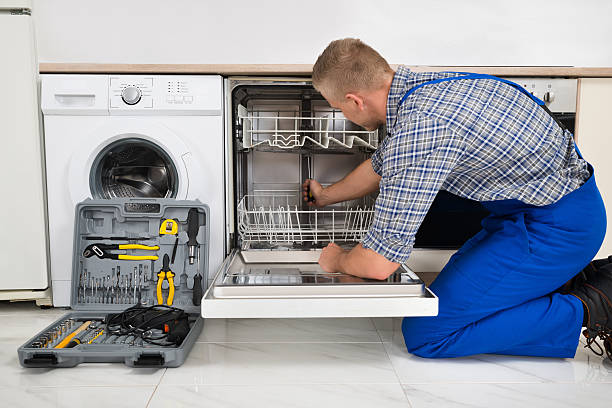

When your dishwasher breaks down, it can be a real inconvenience, disrupting your daily routine and leaving you with a pile of dirty dishes. But when faced with a malfunctioning appliance, one of the biggest questions that arise is whether it's better to repair the dishwasher or replace it entirely. This decision often depends on several factors, including the extent of the damage, the age of the appliance, and the cost of repairs versus replacement. In this article, we'll help you determine whether Dishwasher repair in North Charleston SC, or purchasing a new appliance is the best option for you.
Before deciding whether to repair or replace your broken dishwasher, it’s important to understand the common issues that can affect these appliances. Dishwashers, like any other home appliance, are prone to wear and tear over time. Some common problems include issues with the motor, leaks, clogged hoses, or a malfunctioning control panel. In many cases, a professional appliance repair service can diagnose the problem and offer a solution that restores your dishwasher’s function without the need for a costly replacement.
One of the first factors to consider when deciding whether to repair or replace your dishwasher is its age. If your appliance is relatively new (less than five years old), it’s often worth repairing the dishwasher. The parts are usually still under warranty, and the cost of repairs may be much lower than the price of buying a new one. However, if your dishwasher is over ten years old, it may be nearing the end of its lifespan, and a replacement might be more cost-effective in the long run.
When considering dishwasher repair in North Charleston, SC, another key factor to weigh is the cost of repairing your existing appliance versus the cost of replacing it with a new one. For minor issues, such as a clogged filter or a faulty door seal, repair is often the more affordable option. However, for more serious problems, such as a malfunctioning motor or a broken pump, the repair cost may be close to or exceed the price of a new dishwasher. It’s important to get an estimate from a professional appliance repair service before making a decision.
Choosing an Refrigerator repair to handle your dishwasher repairs can be a smart choice, particularly if you catch the problem early. Professionals have the tools, experience, and expertise to quickly diagnose the issue and perform the necessary repairs. Whether it's fixing a faulty motor or unclogging a drain, a reputable repair service can restore your dishwasher to working condition without the need for a complete replacement.
If your dishwasher is older, it may not be as energy-efficient as newer models. Over time, appliances become more energy-efficient, which means a new dishwasher could save you money on your utility bills. Energy-efficient dishwashers use less water and electricity, reducing your environmental impact and lowering the cost of operating the appliance. This is something to consider if your dishwasher is nearing the end of its life and you’re contemplating whether a replacement might be more economical in the long run.
If your dishwasher is still under warranty, you may be able to get the repairs done at little to no cost. Manufacturer warranties often cover specific parts of the appliance for a set period. Additionally, extended warranties or service plans may offer continued coverage beyond the manufacturer’s standard warranty. This can help make repairs more affordable and keep your appliance in working condition for longer. Be sure to check the terms of any warranties before deciding whether to repair or replace your dishwasher.
It’s worth noting that in some cases, a malfunctioning dishwasher may be part of a larger issue involving other kitchen appliances, such as the refrigerator. If your refrigerator is also having issues, it might make sense to address both appliances at the same time. In many cases, a professional appliance repair service can handle both dishwasher repair and refrigerator repair, saving you time and money.
There are several signs to look for when determining if dishwasher repair is worth it. If the problem is minor, such as an issue with the door latch or a clogged drain, it may be worth repairing the appliance. However, if the motor or control board is malfunctioning, or if the cost of repairs exceeds the value of the dishwasher, it may be better to invest in a new one.
When facing a malfunctioning dishwasher, it can be helpful to think about other appliances in your home, such as the dryer. Dryer repair can also be expensive if the motor or heating element needs to be replaced. Like a dishwasher, the decision to repair or replace a dryer depends on the age of the appliance, the cost of repairs, and the availability of replacement parts. Understanding these factors can help you make an informed decision about your dishwasher.
Another consideration when deciding whether to repair or replace your dishwasher is the environmental impact. Disposing of old appliances can contribute to landfill waste, which is harmful to the environment. If your dishwasher is still functional and can be repaired at a reasonable cost, choosing to repair it rather than replace it can help reduce waste. Additionally, choosing a repair over a replacement may align better with environmentally conscious practices.
In conclusion, deciding whether to repair or replace your broken dishwasher involves careful consideration of the appliance’s age, the cost of repairs, and the long-term value of the appliance. If your dishwasher is still under warranty and the issue is relatively minor, repairing the appliance may be the best option. However, if the dishwasher is old, inefficient, or the repairs are costly, replacement might be the more sensible solution. Consulting with a professional appliance repair service can provide valuable insights and help you make an informed decision. Whether you’re dealing with dishwasher repair, refrigerator repair, or even dryer repair, a skilled technician can assess the situation and offer solutions that are both cost-effective and long-lasting.